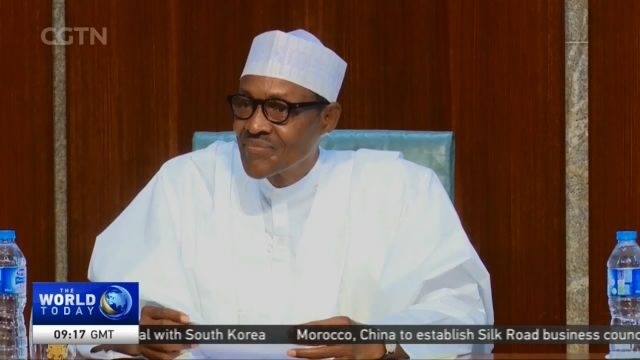
17:51, 28-Mar-2018
Battling Boko Haram: Nigeria talking to insurgents about possible ceasefire

Nigeria's government says its negotiating a ceasefire with jihadist group, Boko Haram. It's the first time the government has publically admitted to negotiating a peaceful end to nearly ten years of conflict. Previous talks with the group have been focused on the release of hostages. CGTN's Kelechi Emekalam has more from the Nigerian capital.
The admission that president Buhari's government is in talks with Boko Haram follows days after the release of more than 100 school girls kidnapped from Dapchi Science and technology college in the northeast. Shortly after their release, the government said back channels were used to secure the freedom of the girls.
Thereafter president Buhari extended unconditional amnesty to insurgents who gave up fighting to pave way for peace in a region that has been troubled for more than 9 years. But his goodwill gesture fell short of revealing an ongoing talks for a more comprehensive cease fire with Boko Haram. Only days later, his information minister Lai Mohammed would go public with the secretive negotiations. Its complete departure from belligerent strategy both sides have fronted against each other for years. Even though the government had earlier expressed willingness to negotiate, nothing really got underway. So what has changed?
KABIR ADAMU SECURITY ANALYST "The political pressure on the government is as such right now that it has to act, it has to do something. On the side of the insurgents, when they started they were just one group. They were active, they were able to take control of territories. Now we're in a situation where we're talking of about three groups factionalised, they are not in control of any territory. So either side no side has been able to beat its chest to say we have achieved what we set out to achieve. So what next if not the negotiation."
Until recently Boko Haram controlled vast territories in the north east-by some estimates, equivalent to Rwanda. But most of that has been retaken and the government has repeatedly said Boko Haram is defeated. The big problem for government is Boko Haram still carried on with bloody attacks on civilians and military installation. To this point, there is very little information on the negotiations-How far it has the negotiations have progressed, what the agenda is or even who is mediating are still unknown. Boko Haram is split into two factions, to achieve a sustainable peace, the government will have to convince both sides on this new idea ceasefire.
KABIR ADAMU SECURITY ANALYST "The indications are that discussions are on with both factions. Other indications are that traction is being gained more on the Al- Barnawi than the Shekau faction. Now if the government can achieve a ceasefire with both factions, then yes we're happier for it. Personally, I don't think the Shekau faction is ready for a ceasefire. I think it'd probably be easier to achieve that with the Al-Barnawi faction. They're more organised, they seem to be more structured and they are less indiscriminate in their violence than the Shekau faction. So I'm more hopeful with regard to a ceasefire with them. But even if it's just with them, it's a good beginning, it will now allow government to focus on just the other faction."
KELECHI EMEKALAM ABUJA, NIGERIA "Nigerians will be heading for general elections next year and security in the northeast would be a big rallying point for politicians on either side, President Buhari's camp knows, despite the successes his administration has recorded against Boko Haram, it would be a lot easier to make a case if Boko Haram insurgency is out of the question and that is largely why his administration will not overlook any avenue to resolve the conflict ahead of the elections. Kelechi Emekalam, CGTN Abuja Nigeria."

SITEMAP
Copyright © 2018 CGTN. Beijing ICP prepared NO.16065310-3
Copyright © 2018 CGTN. Beijing ICP prepared NO.16065310-3